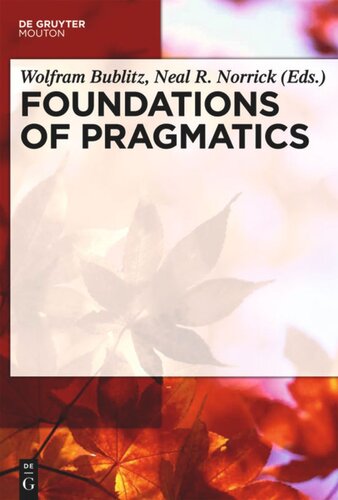

Most ebook files are in PDF format, so you can easily read them using various software such as Foxit Reader or directly on the Google Chrome browser.
Some ebook files are released by publishers in other formats such as .awz, .mobi, .epub, .fb2, etc. You may need to install specific software to read these formats on mobile/PC, such as Calibre.
Please read the tutorial at this link: https://ebookbell.com/faq
We offer FREE conversion to the popular formats you request; however, this may take some time. Therefore, right after payment, please email us, and we will try to provide the service as quickly as possible.
For some exceptional file formats or broken links (if any), please refrain from opening any disputes. Instead, email us first, and we will try to assist within a maximum of 6 hours.
EbookBell Team

4.1
60 reviewsOpening the 9-volume-series Handbooks of Pragmatics, this handbook provides a comprehensive overview of the foundations of pragmatics. It covers the central theories and approaches as well as key concepts and topics characteristic of mainstream pragmatics, i.e. the traditional and most widespread approach to the ways and means of using language in authentic social contexts. The in-depth articles provide reliable orientational overviews useful to researchers, students, and teachers. They are both state of the art reviews of their topics and critical evaluations in the light of subsequent developments. Topics are thus considered within their scholarly context and also critically evaluated from current perspectives. The five major sections of the handbook are dedicated to the Conceptual and Theoretical Foundations (with a historiographic overview of the establishment and subsequent development of pragmatics), Key Topics (investigating indexicality, reference and other concepts that were the first to make their way from grammar into pragmatics and mainstream notions like speech acts, types of inference), the Place of Pragmatics in the Description of Discourse (delimiting pragmatics from grammar, semantics, prosody, literary criticism), and Methods and Tools.